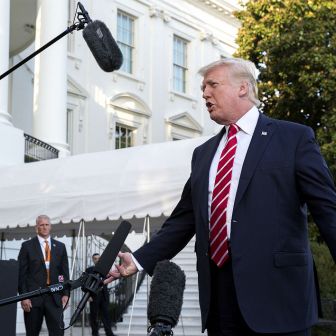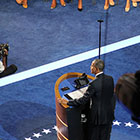ON SUPER Tuesday Mitt Romney won more delegates than his competition and, crucially, beat Rick Santorum in Ohio. But he didn’t so much win Super Tuesday as survive it. Romney’s weak win meant he awoke the day after Super Tuesday to a fresh barrage of criticism, doubts and second-guessing from influential conservatives concerned that Republican voters won’t coalesce around his campaign and that he can’t bring voter enthusiasm to the Republican race.
Romney’s small margin of victory hasn’t eased doubts about his candidacy, even as he argues that his large margin of delegates makes him the inevitable nominee. It also undercuts his claim to be the candidate best able to beat Barack Obama in the swing states that decide presidential elections. The GOP race looks likely to continue for some months to come and the real winner in Ohio – quite literally – was President Obama, who scored more votes in an uncontested Democrat primary than Romney.
“Super Tuesday was a super mess,” said one GOP strategist. “Romney’s organisation can produce results and delegates, but they are having a tough time overcoming Santorum’s passionate supporters.”
Romney needs to expand his voter base, especially in the south, where he is struggling to gain the support of the Tea Party, very conservative voters and evangelical Christians – groups that hold large sway over GOP primaries in many southern states. As a consequence, he could struggle to win states such as Kansas, Mississippi, Alabama and Louisiana, which are next on the primary calendar.
It can be argued that Romney’s wins come only as a consequence of his huge spending – and he did indeed outspend Santorum four to one in Ohio. His modus operandi to date has been to use his financial advantage to run blazingly negative media campaigns against his opponents as, one by one, they have risen in the polls. But there are signs that Romney’s once-huge war chest is starting to run low, and that he has maxed out on large donations.
Santorum can continue for some time yet because he runs a shoestring operation (hobbled, admittedly, by a lack of organisation and planning). Newt Gingrich survives because he has one large, very generous financial supporter, and Ron Paul is able to tap into a small but passionate network of supporters.
The Romney team must be hoping that Gingrich sticks around for a while because the former House speaker’s campaign divides the conservative vote and thus serves to boost Romney’s odds of being the nominee. If Gingrich can win some of the upcoming contests in the south, then Santorum’s race gets much tougher.
That’s why the Red, White and Blue Fund, the Super PAC supporting Santorum’s presidential bid, is calling on Gingrich to drop out of the race and clear a path to the right for Santorum. Gingrich, it says, is a “hindrance to a conservative alternative.” Certainly Santorum would have won both Ohio and Michigan if Gingrich had dropped out.
The fact is that currently no one among the Republican candidates is well placed to win in a general election. Romney’s gaffes point to a man out of touch with the average American, and his standing among independent voters is more negative now than it was when the primary battle began. All the candidates are in trouble with women, as a result of their recent attacks on contraception, and with Hispanics concerned about immigration policies. Everyone is turned off by the negative tone of the campaign.
The current lack of enthusiasm for both the contenders and the campaign is making getting out the vote increasingly difficult; Republican voters seem to be losing interest in the prolonged and messy contest to choose a nominee to challenge President Obama. According to exit polls, only four out of ten voters in Ohio said they were strongly behind their candidate. Voter turnout in the twenty-two states that have held primaries and caucuses so far has fallen about 8 per cent overall compared with 2008. Obama and the Democrats are the beneficiaries of this malaise.
A recent poll showed that one third of potential GOP voters want a new candidate, someone completely different from those running. One Ohio voter summed up the minuses of current candidates this way: “Romney is too rich, Santorum is too religious, Ron Paul is too old, and I just don’t like Gingrich.” Many voters just want Ronald Reagan redux – although it’s interesting to speculate if even Reagan would pass the conservatives’ litmus tests today.
The prevailing wisdom about primary campaigns is that Republicans run to the right and Democrats to the left during the primary season, because primary voters tend to be more passionate and hardcore than the general electorate. Once the nominations are secured, both candidates move to the centre, where the mass of general election voters are presumed to be.
But it’s unclear whether that will hold true for Republicans in 2012. Romney will have to execute a large number of flip-flops to execute that strategy, which would further undermine his credibility.
The GOP leaders console themselves that the final nominee will be able to unite the party and – no longer needing to battle the egos of his opponents – will move on to highlight Obama’s weaknesses and present himself as a convincing alternative to Obama’s leadership. And, indeed, the visceral dislike of the president and his policies among those on the right could ensure that this happens, especially if the economic recovery weakens, unemployment remains high and the housing market slump fails to recover.
There are some wild cards that could also alter the political landscape between now and November. These include market collapses in Europe, hostilities between Israel and Iran, and a terrorist incident on American soil. Despite her public musing, we can be reasonably sure that the wild cards do not include Sarah Palin riding to the rescue at the Republican convention.
For the moment, though, the Obama–Biden campaign’s leaders must be quietly confident of a victory in November. The polls have Obama’s approval ratings up, and show him beating any of the possible candidates in a match-up. These improved numbers and the growing angst about the Republican presidential field have led some high-profile conservatives, including columnist George Will, to suggest that Congress, not the White House, should be the party’s focus in 2012.
Since neither Mitt Romney nor Rick Santorum is likely to defeat President Obama in the general election, Will believes that the party should turn its attention to retaining control of the House of Representatives, taking back the Senate, and reducing the president to a “lame-duck” who “would have a substantially reduced capacity to do harm.” This GOP philosopher is willing to wait four more years until, when Obama’s time is up, young up-and-comers such as Chris Christie, Paul Ryan and Marco Rubio will have a better shot at winning the White House.
Whether this approach would play out in the way predicted is impossible to know, but the fact that George Will feels moved to present it publicly says much for the state of GOP presidential politics in 2012. •




